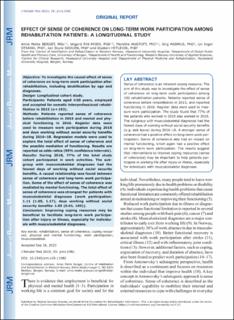| dc.contributor.author | Berget, Anne Mette Gravaas | |
| dc.contributor.author | Moen, Vegard Pihl | |
| dc.contributor.author | Hustoft, Merethe | |
| dc.contributor.author | Assmus, Jörg | |
| dc.contributor.author | Strand, Liv Inger | |
| dc.contributor.author | Skouen, Jan Sture | |
| dc.contributor.author | Hetlevik, Øystein | |
| dc.date.accessioned | 2024-01-19T13:02:29Z | |
| dc.date.available | 2024-01-19T13:02:29Z | |
| dc.date.created | 2024-01-11T13:59:01Z | |
| dc.date.issued | 2023 | |
| dc.identifier.citation | Journal of Rehabilitation Medicine. 2023, 55 . | en_US |
| dc.identifier.issn | 1650-1977 | |
| dc.identifier.uri | https://hdl.handle.net/11250/3112839 | |
| dc.description.abstract | Objective: To investigate the causal effect of sense of coherence on long-term work participation after rehabilitation, including stratification by age and diagnoses.
Design: Longitudinal cohort study.
Participants: Patients aged ≤ 60 years, employed and accepted for somatic interprofessional rehabilitation in 2015 (n = 192).
Methods: Patients reported sense of coherence before rehabilitation in 2015 and mental and physical functioning in 2016. Register data were used to measure work participation during 2018 and days working without social security benefits during 2016–18. Regression models were used to explore the total effect of sense of coherence and the possible mediation of functioning. Results are reported as odds ratios (95% confidence intervals).
Results: During 2018, 77% of the total study cohort participated in work activities. The subgroup with musculoskeletal diagnoses had the fewest days of working without social security benefits. A causal relationship was found between sense of coherence and long-term work participation. Some of the effect of sense of coherence was mediated by mental functioning. The total effect of sense of coherence was strongest for patients with musculo-skeletal diagnoses (work participation: 1.11 (1.05, 1.17), days working without social security benefits: 1.05 (0.01, 109)).
Conclusion: Improving coping resources may be beneficial to facilitate long-term work participation after injury or illness, especially for individuals with musculoskeletal diagnoses. | en_US |
| dc.language.iso | eng | en_US |
| dc.publisher | Medical Journals Sweden | en_US |
| dc.rights | Navngivelse-Ikkekommersiell 4.0 Internasjonal | * |
| dc.rights.uri | http://creativecommons.org/licenses/by-nc/4.0/deed.no | * |
| dc.title | Effect of sense of coherence on long-term work participation among rehabilitation patients: A longitudinal study | en_US |
| dc.type | Peer reviewed | en_US |
| dc.type | Journal article | en_US |
| dc.description.version | publishedVersion | en_US |
| dc.rights.holder | Copyright (c) 2023 Anne Mette Berget, Vegard Pihl Moen, Merethe Hustoft, Jörg Assmus, Liv Inger Strand, Jan Sture Skouen, Øystein Hetlevik | en_US |
| dc.source.pagenumber | 0 | en_US |
| dc.source.volume | 55 | en_US |
| dc.source.journal | Journal of Rehabilitation Medicine | en_US |
| dc.identifier.doi | 10.2340/jrm.v55.11982 | |
| dc.identifier.cristin | 2224662 | |
| cristin.ispublished | true | |
| cristin.fulltext | original | |
| cristin.qualitycode | 1 | |

